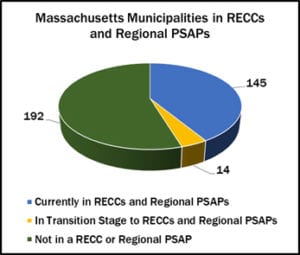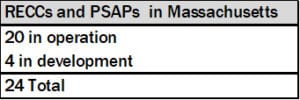Why Regionalize?
Properly designed and implemented, regionalization of emergency communications can improve services for residents and working conditions for employees, and it can reduce risks and long-term costs.
Benefits on the Ground
A recent study included 161 interviews with police chiefs, fire chiefs, town managers, mayors, police officers, firefighters, and dispatchers in 34 Massachusetts municipalities. The top five cited benefits of a RECC are as follows:
- More effective call-taking and dispatching services
- More dispatch personnel for major events and surges of 911 calls
- Standardization of protocols
- Cost savings
- Enhanced Mutual Aid
Trends in Dispatch
 The current trend of the 911 communication discipline focuses on standards, best practices, personnel selection, training requirements, and utilization of technology. To enhance professionalism of communications centers requires a better understanding of the current plans to modernize emergency communications nationwide. The trends are focused on:
The current trend of the 911 communication discipline focuses on standards, best practices, personnel selection, training requirements, and utilization of technology. To enhance professionalism of communications centers requires a better understanding of the current plans to modernize emergency communications nationwide. The trends are focused on:
- Increasing capability to handle data, voice, and video;
- Enhancing the cost effectiveness of human and technical resources;
- Integrating text messaging into PSAP operations and personnel training;
- Dealing with the challenges of multiple calls for service to the same events from the transition from wire to wireless communication devices; and
- Handling the increased prevalence of video recording among younger generations.
The Role of the State 911 Department
The State 911 Department is an agency within the Executive Office of Public Safety and Security that has the authority and responsibility to direct the day-to-day administration of the statewide enhanced 911 system. Since 2008 when the Department was established, it has focused on constant improvement of the 911 system. The Department has identified that regionalization of emergency communications for most municipalities would provide for enhanced 911 call-taking and dispatching services through a cost-effective use of human and technical resources.
Resources for PSAP and RECC Regionalization
The Department provides a specific grant program to develop and operate RECCs. Below is a listing of the relevant information for these grants.
Support and Incentive Grants
Purpose: To assist PSAPs and RECCs in providing enhanced 911 services and to encourage the development of regional PSAPs, regional secondary PSAPs, and RECCs.
Eligibility: Primary PSAPs, regional PSAPs, regional secondary PSAPs, and RECCs. Funds are disbursed according to a formula weighing both 911 call volume and the population served.
Regional Development Grants
Purpose: To develop and start up Regional PSAPs, Regional Secondary, and RECCs, and to expand or upgrade existing regional PSAPs, Regional Secondary PSAPs, and RECCs.
Eligibility: Primary PSAPs, regional PSAPs, regional secondary PSAPs, and RECCs. In addition, public safety departments, municipalities, or other governmental bodies that intend on forming new regional PSAPs, regional secondary PSAPs, and RECCs are eligible to participate with proof of intent of all entities involved.
*New for FY23* Regional Development Grant – Transition Award
Purpose: To assist communities that decommission their PSAP to join a regional PSAP or RECC by covering a significant portion of their cost sharing payments for a multi-year transition period.
Eligibility: Communities that decommission their PSAP to join a regional PSAP or RECC. Such transition award(s) shall be credited against the obligation of the decommissioned PSAP(s) by the grantee. The full transition award is provided for three years, in the fourth year it is 50% of the award and in the fifth year it is 25%.
